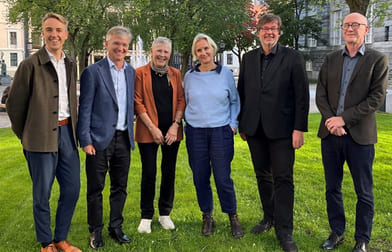Technological innovations have made it cheaper and easier to launch satellites into orbit, and the space industry is growing rapidly. In April 2021, there were just under 4,000 active satellites orbiting the Earth, compared with nearly 12,000 in June 2025, and private actors are becoming increasingly important. Elon Musk’s SpaceX alone accounts for around 65 per cent of all active satellites.
The policy brief is available in English below:
The Norwegian Space Industry Enters a New Era
Satellite technology is essential for navigation, communication, power management, financial transactions, weather forecasting, and Earth observation. Even short disruptions can paralyse critical societal functions. With rising geopolitical tensions, the need to protect space-based services from sabotage—both in orbit and on the ground—is increasing. It is therefore important to assess which services Norway should maintain national control over.
China aims to become a space superpower by 2040 and is investing heavily in space activities, while the United States has recently adopted a framework for warfare in space and plans to equip satellites with weapons to create a space-based missile shield.
Europe, meanwhile, is falling behind in the new space race. Of the 263 launches worldwide last year, Europe accounted for only three. Its dependence on American companies has become apparent: Europe must rely on SpaceX for satellite launches, and Ukraine depends on Elon Musk’s Starlink for communications and on Maxar for satellite imagery.
Norway is a small player globally but could become the first country to launch satellites from European soil. With the world’s largest commercial ground station network on Svalbard, a growing space industry, and a strategic location in the north, Norwegian space activity could take on an increasingly important role—also internationally.
Summary
Satellites are essential for banking services, weather forecasting, communication, and navigation.
The number of satellites has tripled since 2021, with commercial actors such as Starlink dominating the market.
While the United States, China, and Japan are expanding their space programmes, Europe is falling behind. The war in Ukraine has demonstrated the need for secure access to space services.
Norway has a strategic location, a spaceport, a ground station network, and a growing space industry. Key issues include access to EU space programmes, new space legislation, and the role of the space sector in national security.



